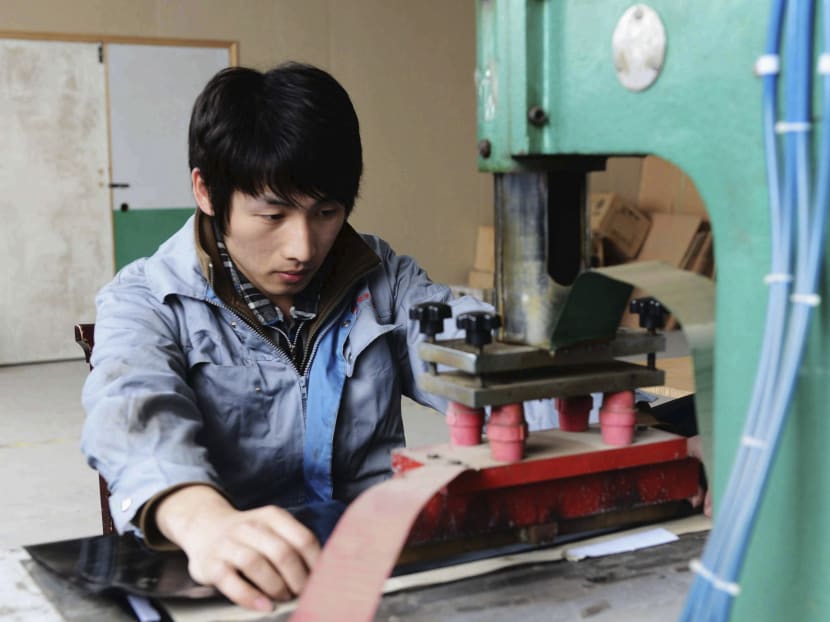Millennial workers force rethink in Chinese factories
BEIJING — When Mr Ioan Gornic suddenly starts blasting out 1990s dance hit No Limits, the assembled 20 European factory managers shift nervously in their seats and try to avoid eye contact.

Unlike their parents, who saw a factory job as a rare opportunity to get ahead, young Chinese workers today want more control over their lives. Photo: Reuters
BEIJING — When Mr Ioan Gornic suddenly starts blasting out 1990s dance hit No Limits, the assembled 20 European factory managers shift nervously in their seats and try to avoid eye contact.
“Don’t worry, I’m not going to sing,” says the Shenzhen-based general manager for Zobele, an Italian maker of air fresheners and insect repellent. “I just want to make the point that the only limits are the ones we put on ourselves.”
Mr Gornic, a manufacturing veteran, is running a workshop on “talent management” for executives in China’s factory heartland, where fast-rising wages, changing demographics and the differing needs of millennials are forcing companies to rethink the way they handle their workforce.
Rather than treating workers like an unlimited, easily replaceable resource, he argues that factory managers “need to understand better who they are, what they need, and how to make them more efficient”.
Unlike their parents, who saw a factory job as a rare opportunity to get ahead, today’s young Chinese workers have more options, especially in the fast-expanding services sector, and want more control over their lives, rather than being forced into long overtime shifts.
The flow of migrants into the factories of Shenzhen and other parts of Guangdong province has also been falling because of China’s ageing population, giving workers more bargaining power over pay and working conditions.
As the wages of unskilled factory operators have risen as high as 4,000 yuan (S$825) a month in Guangdong, some companies have responded by investing in industrial robots and automation, while some others have moved to areas with cheaper labour, such as western China, South-east Asia, or Africa.
But many international factory managers say they would rather stay in Guangdong, which produced more than a quarter of China’s exports last year, to capitalise on the deep skills base and the well-developed infrastructure and supply chain.
“You have to improve productivity, that’s the root cause of the problem,” says Mr Thierry Jamet, who manages 450 workers at the Shenzhen factory of Altra Industrial Motion, a United States maker of clutches and brakes.
As foreign manufacturers face ever-greater competition from cut-price Chinese rivals, he says the only way to beat them is to take a more enlightened approach to developing the workforce.
“People, not machines, are the best capital we have,” says Mr Jamet, at the workshop organised by the European Chamber of Commerce in China.
Mr Gornic, whose company works with demanding multinationals such as Reckitt Benckiser and Procter & Gamble, says factories need to do more than simply provide workers with accommodation and sports facilities.
He has developed one programme that brings in graduates and trains them for the top management posts, and another designed to help the best of the unskilled workers on the factory floor move into senior supervisory roles. He is also implementing the Japanese concept of ‘‘kaizen’’, or continuous improvement, creating teams of managers and workers that try to shave vital minutes and costs off the manufacturing process.
Mr Jamet says he was able to significantly simplify production in just one day after setting up such a team.
“You need to lead by example,” he says. “If the top management is involved in the kaizen, then the operators are really committed.”
Ms Susanne Choi, a sociology professor at the Chinese University of Hong Kong, who studies migrant workers in China, says the expectations of young workers these days are very different from those of their parents. “They are no longer willing to just accept anything on the table,” she explains. “The younger cohort typically has a higher level of education and a better family background.”
Factory managers say they are having to adopt a more thoughtful approach to their staff, offering overtime to those keen to boost their spending power while letting others do routine shifts in order to have more of a life outside work.
Mr Paris Hadjisotiriou, a Shenzhen-based executive for Oberthur Technologies, a French group that makes credit cards and other payment-related products, has tried to win over his workforce with matchmaking. Many young workers prefer to return to their hometown after a few years to meet a marriage partner. As such, he has organised social events to help workers from different factories to meet, because “it is easier to retain them if they can find a boyfriend or girlfriend”.
Ultimately, Ms Choi says, companies will have to develop factories that are much less like the sweatshops of old, and more like their counterparts in the developed world, where workers are taken more seriously and imbued with a greater sense of pride.
“Employers need a more segmented strategy to control their workers,” she says. “This may be new in China, but not in other economies.” FINANCIAL TIMES





